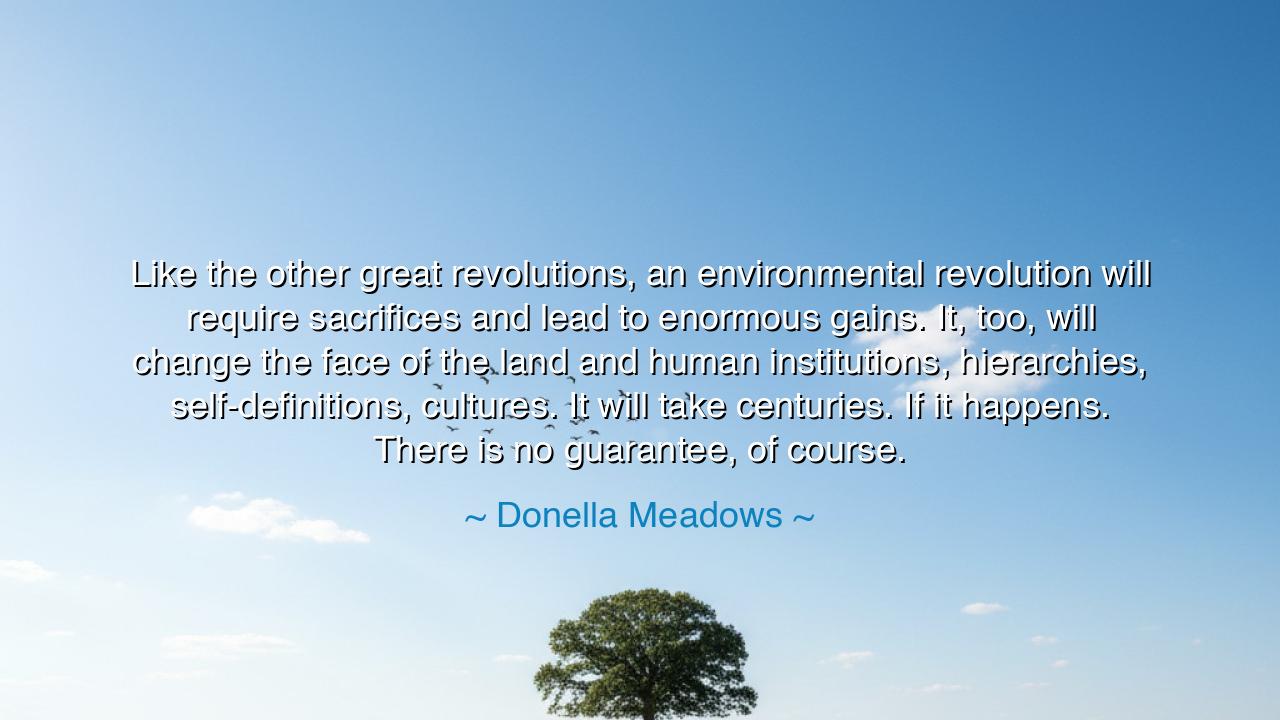
Like the other great revolutions, an environmental revolution
Like the other great revolutions, an environmental revolution will require sacrifices and lead to enormous gains. It, too, will change the face of the land and human institutions, hierarchies, self-definitions, cultures. It will take centuries. If it happens. There is no guarantee, of course.






Hear the voice of the seer Donella Meadows, who, gazing upon the fate of the earth, proclaimed: “Like the other great revolutions, an environmental revolution will require sacrifices and lead to enormous gains. It, too, will change the face of the land and human institutions, hierarchies, self-definitions, cultures. It will take centuries. If it happens. There is no guarantee, of course.” These words, spoken with both hope and warning, are a summons to courage in the age of peril. They remind us that the salvation of the earth is no swift battle, but a long campaign, whose victories will demand patience, humility, and the offering up of comfort for the sake of survival.
For what is a revolution but the overturning of an old order and the birth of a new? The agrarian revolution transformed wandering tribes into cities. The industrial revolution harnessed coal and fire, reshaping every corner of human life. These were not gentle transitions but upheavals, marked by toil, sacrifice, and struggle. So too, Meadows tells us, must be the environmental revolution—not a whisper of reform, but a roaring transformation, altering our use of land, our institutions, our very definitions of wealth, success, and identity.
Mark well her wisdom: such change will take centuries, and even then, there is no guarantee it will come. For unlike revolutions of the past, which fed on human ambition and desire for power, this one requires restraint, patience, and self-denial. To burn less, to consume less, to profit less—these are sacrifices not easily embraced by mankind. Yet Meadows insists that only through such sacrifice will the gains be “enormous”: clean air, living forests, rivers that run pure, and cultures rooted not in plunder but in balance.
Consider the tale of Japan in the Edo period, when centuries of deforestation threatened the islands with ruin. The rulers, seeing the crisis, enforced strict conservation—regulating logging, mandating replanting, reshaping entire communities to live within the limits of the land. It was not easy, but it preserved the forests, and in time the nation found stability. This is but a glimpse of what Meadows foresaw: that institutions, hierarchies, and cultures themselves must be remade if the earth is to endure.
And yet, history also warns of failure. The people of Easter Island, who felled every tree for monuments, never found their environmental revolution. When their forests were gone, their society collapsed into famine and despair. They lacked the vision, the restraint, the collective will to save themselves. Meadows’ words echo this tragic truth: “There is no guarantee, of course.” For the survival of mankind depends not on inevitability but on choice, and humanity has often chosen poorly.
What then must you learn, O listener? That this revolution cannot be left to the future alone. Every act of conservation, every reduction of waste, every shift toward renewable energy is a stone laid in the foundation of centuries yet to come. Though you may not live to see the fruits of this labor, your children, and their children, may walk in forests you preserved and drink from rivers you kept clean. To act now is to plant seeds for a harvest that will outlast your lifetime.
Therefore, let Meadows’ words guide your heart. Embrace sacrifice, not as loss, but as offering. Teach your communities to measure greatness not by what they consume, but by what they sustain. Demand of your leaders vision that reaches beyond the next election, to the horizon of centuries. And in your own life, live gently with the earth: consume less, share more, plant where others destroy, protect where others neglect. For though the outcome is uncertain, the path of wisdom is clear.
Thus let her prophecy echo across the ages: the environmental revolution will come only if men and women dare to embrace it. It will demand struggle, yet its gains will be vast. Whether it happens depends on us. Choose, then, not the path of ruin, but the path of stewardship, that future generations may bless your name for preserving the earth, their first and eternal home.






AAdministratorAdministrator
Welcome, honored guests. Please leave a comment, we will respond soon